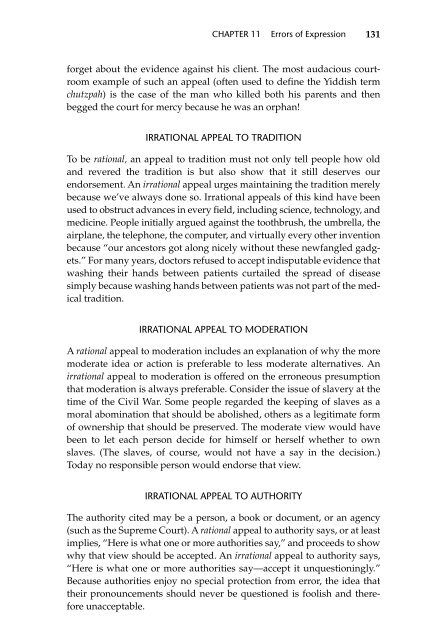Beyond Feelings
Beyond Feelings
Beyond Feelings
You also want an ePaper? Increase the reach of your titles
YUMPU automatically turns print PDFs into web optimized ePapers that Google loves.
CHAPTER 11 Errors of Expression<br />
131<br />
forget about the evidence against his client. The most audacious courtroom<br />
example of such an appeal (often used to define the Yiddish term<br />
chutzpah) is the case of the man who killed both his parents and then<br />
begged the court for mercy because he was an orphan!<br />
IRRATIONAL APPEAL TO TRADITION<br />
To be rational, an appeal to tradition must not only tell people how old<br />
and revered the tradition is but also show that it still deserves our<br />
endorsement. An irrational appeal urges maintaining the tradition merely<br />
because we’ve always done so. Irrational appeals of this kind have been<br />
used to obstruct advances in every field, including science, technology, and<br />
medicine. People initially argued against the toothbrush, the umbrella, the<br />
airplane, the telephone, the computer, and virtually every other invention<br />
because “our ancestors got along nicely without these newfangled gadgets.”<br />
For many years, doctors refused to accept indisputable evidence that<br />
washing their hands between patients curtailed the spread of disease<br />
simply because washing hands between patients was not part of the medical<br />
tradition.<br />
IRRATIONAL APPEAL TO MODERATION<br />
A rational appeal to moderation includes an explanation of why the more<br />
moderate idea or action is preferable to less moderate alternatives. An<br />
irrational appeal to moderation is offered on the erroneous presumption<br />
that moderation is always preferable. Consider the issue of slavery at the<br />
time of the Civil War. Some people regarded the keeping of slaves as a<br />
moral abomination that should be abolished, others as a legitimate form<br />
of ownership that should be preserved. The moderate view would have<br />
been to let each person decide for himself or herself whether to own<br />
slaves. (The slaves, of course, would not have a say in the decision.)<br />
Today no responsible person would endorse that view.<br />
IRRATIONAL APPEAL TO AUTHORITY<br />
The authority cited may be a person, a book or document, or an agency<br />
(such as the Supreme Court). A rational appeal to authority says, or at least<br />
implies, “Here is what one or more authorities say,” and proceeds to show<br />
why that view should be accepted. An irrational appeal to authority says,<br />
“Here is what one or more authorities say—accept it unquestioningly.”<br />
Because authorities enjoy no special protection from error, the idea that<br />
their pronouncements should never be questioned is foolish and therefore<br />
unacceptable.


